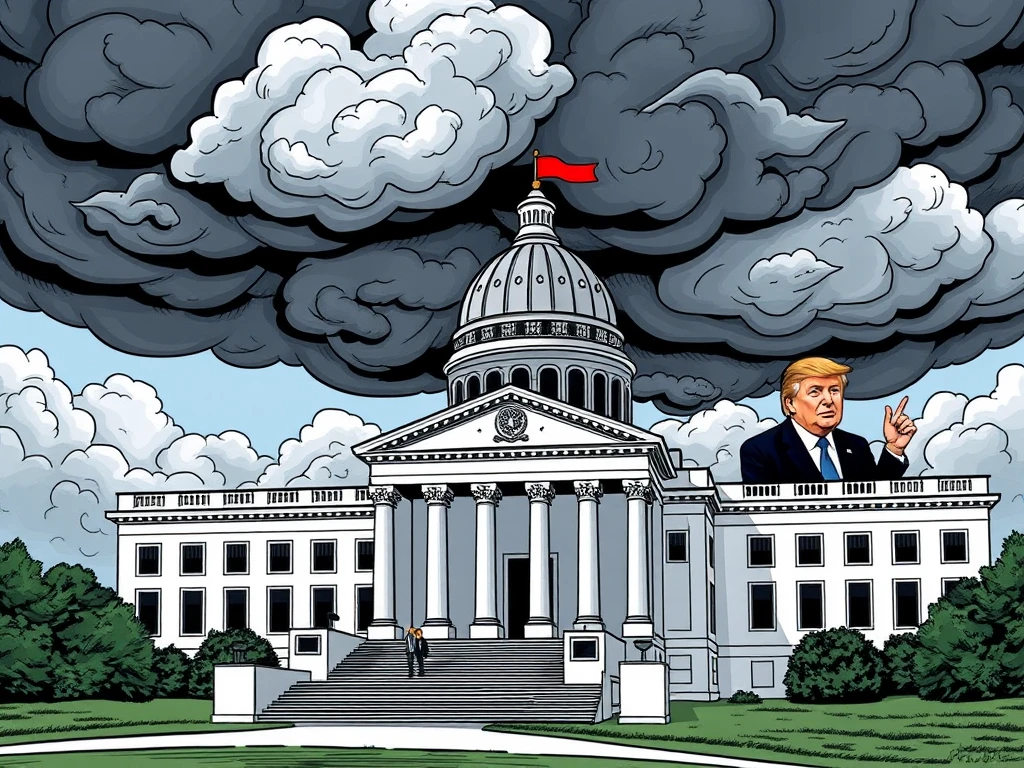Urgent: US Crypto Regulation Stalls Amid Trump Ethics Scandal

Efforts to advance US crypto regulation are hitting significant roadblocks in the Senate. A major factor contributing to this delay is the growing controversy surrounding former President Donald Trump’s financial connections within the crypto space. This situation is raising serious questions about potential conflicts of interest and ethics.
Why Are Senate Crypto Bills Facing Delays?
Several factors are contributing to the current pause in progress for Senate crypto bills. At the forefront are ethical concerns tied to Donald Trump’s recent activities and reported deals in the digital asset sector.
- Senators Elizabeth Warren and Jeff Merkley initiated an ethics probe into a reported $2 billion investment deal involving a UAE-backed firm (MGX), Binance, and World Liberty Financial (WLFI).
- The senators expressed concerns that this deal, particularly involving WLFI’s stablecoin, could violate the US Constitution’s Emoluments Clause and federal bribery laws.
- They warn that Trump and his associates could potentially profit significantly from such arrangements, raising flags about foreign influence and self-enrichment.
Trump Crypto Ties Under Scrutiny
The ethics probe highlights specific Trump crypto ties. The alleged $2 billion deal centers on an investment into Binance using WLFI’s USD1 stablecoin. Senators Warren and Merkley suggest this could be a method for Trump’s family and allies to benefit from foreign sources.
Adding to the scrutiny are Trump’s recent fundraising activities, including high-cost dinners potentially attended by figures in the crypto industry, and plans for events specifically with holders of the Official Trump (TRUMP) memecoin. These events, following large political fundraisers, amplify concerns about potential influence and personal gain tied to digital assets.
Impact on Stablecoin Legislation and Other Bills
The controversy is directly impacting stablecoin legislation, such as the GENIUS Act, which was nearing a potential Senate vote. The fallout has prompted some Democratic lawmakers to demand additional hearings and question whether Trump’s personal stake in digital assets is hindering bipartisan support for essential US crypto regulation.
While Senate Majority Leader John Thune indicated a willingness to amend GOP-backed stablecoin legislation to secure passage, internal party disagreements, like Senator Rand Paul’s uncertainty, also present challenges. The legislative gridlock isn’t confined to the Senate, with House committees also seeing resistance to discussions on digital assets.
Crypto Community Reacts to Political Hurdles
The political pushback is drawing criticism from prominent figures within the crypto community. Many see the delays as detrimental to innovation and market clarity.
Tyler Winklevoss, co-founder of Gemini, voiced his frustration on social media, suggesting that blocking stablecoin legislation would be politically costly for Democrats.
The sentiment among many in the industry is that political maneuvering and ethics concerns, particularly related to Trump crypto ties, are unfairly impeding necessary regulatory progress.
Addressing Crypto Ethics in Legislation
The current situation underscores the critical need to address crypto ethics within future legislation. Any framework for stablecoin legislation or broader US crypto regulation must consider potential conflicts of interest, foreign influence, and mechanisms to ensure transparency and prevent self-dealing by public officials or those closely connected to them.
The challenges highlight the complex intersection of politics, personal finance, and emerging technology, making the path forward for Senate crypto bills uncertain.
In summary, the push for US crypto regulation faces significant headwinds. Ethics concerns surrounding Donald Trump’s reported crypto investments and political fundraising activities have triggered probes and caused delays for key Senate crypto bills, including vital stablecoin legislation. While some lawmakers seek compromise, the controversy has injected uncertainty into the legislative process, drawing sharp criticism from the crypto community concerned about stalled progress and the potential for conflicts of interest to derail crucial regulatory clarity.









